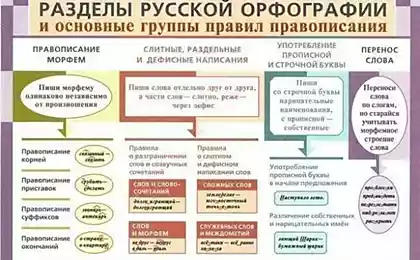166
Rules of spelling called
Everyone has words that confuse them. You know the word, you understand it, but you don’t know how to write it. And most often this happens with dialects. The fact is that most of them are not written according to rules, but because “just remember and write like this.”

DepositPhotos
Sometimes mistakes in spelling adverbs turn them into unpleasant mutants. And to avoid that, "Site" tells spelling. And cats warmly share examples of the use of these insidious words.
Spelling rules for adverbs
We often use phrases with dialects, so it is so important to learn how to write them correctly. The most insidious you now know, it is left to remember and not to repeat such mistakes again. Good luck!
In addition to adverbs, in Russian there is another headache - verbs. Recently, we wrote about typical speech errors associated with invented verbs that appeared by mistake.
We often make materials that help us all get better and not make mistakes. For example, recently we've been sorting out the most common and terrible mistakes in the Russian language.
And we made a selection of words about food, in which it is better not to make mistakes. Be sure to look!
Did you like the material? Be sure to share it with your friends!

DepositPhotos
Sometimes mistakes in spelling adverbs turn them into unpleasant mutants. And to avoid that, "Site" tells spelling. And cats warmly share examples of the use of these insidious words.
Spelling rules for adverbs
- Briefly.
This is the king of mutants among the adverbs, as only he is not twisted: stealthily, gracefully, in brief. To understand how to write correctly, you need to understand that the word “briefly” does not exist, which means that separate writing is discarded immediately. In fact, the adverb “briefly” is formed from the adjective “short” to a comparative degree. Such adverbs are usually written together with prefixes. So remember, spell correctly.
DepositPhotos - Too much.
Here, too, there are often some tricky options for writing. However, it is worth remembering that it is correct to write “too much”, without options. This word has come a long way and now looks like this, you just need to remember.
DepositPhotos - Carry under your arm
One more adverb that is perplexing, let's sort it out. The armpit is a noun, written together and literally means “the area under the muscle.” But "under the arm" is an adverb. For example, he carries a newspaper under his arm. It's important to catch the difference.
DepositPhotos - Stay alert.
We often hear the phrase “be alert”, that is, be prepared for something, be alert. It's an adverb, and it's written together. There is, of course, the phrase “on the check”, but this is in the case when “check” is a part of the grenade. In all other cases, it is correct to write “on guard”.
DepositPhotos - Show off.
The situation here is about the same. If this is an adverb, we write "to show." For example, doing something to show off. If it is a noun (if we are talking about showing a new collection of clothes), then we write separately.
DepositPhotos - For real.
An adverb that means "not seriously, not really, as a joke." But the writing is quite real, and it will be correct “fake-up”.
DepositPhotos - Half-turn.
No matter how much you want to write this word through a hyphen, you can not do this. The rule is as follows: adverbs beginning with “half” are always written together. Therefore, it is correct to write “half-turn”.
DepositPhotos - Hardly.
Another time when you just need to remember. This word is formed from the combination of the adverb “rare” and the particle “li” and is always written separately.
DepositPhotos - Touching.
Another dialect, which is written separately always and without exception. I want to write because of similar adverbs: blindly, randomly, and so on. They are written together, yes, but do not succumb to provocations. The right thing to do is to touch.
DepositPhotos
We often use phrases with dialects, so it is so important to learn how to write them correctly. The most insidious you now know, it is left to remember and not to repeat such mistakes again. Good luck!
In addition to adverbs, in Russian there is another headache - verbs. Recently, we wrote about typical speech errors associated with invented verbs that appeared by mistake.
We often make materials that help us all get better and not make mistakes. For example, recently we've been sorting out the most common and terrible mistakes in the Russian language.
And we made a selection of words about food, in which it is better not to make mistakes. Be sure to look!
Did you like the material? Be sure to share it with your friends!
































